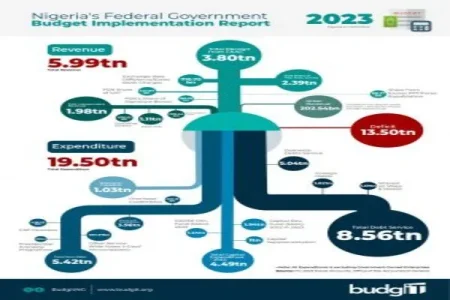
Nigeria's Federal Government reported a staggering fiscal deficit of N13.50 trillion in 2023, with expenditures of N19.50 trillion outpacing revenues of N5.99 trillion. Debt servicing accounted for 43.9% of the budget, highlighting ongoing financial challenges and the urgent need for fiscal reform.
The Nigerian Federal Government's fiscal health has taken a significant hit, as revealed in a recent statement by BudgIT, a civic tech organization. The country recorded a staggering fiscal deficit of N13.50 trillion in 2023, having generated only N5.99 trillion in revenue, leading to total expenditures of N19.50 trillion—over three times its revenue.
According to BudgIT, fiscal deficits occur when total government expenditures exceed revenues, compelling the government to borrow to bridge the gap. This situation exacerbates the country's already high debt burden. The 2023 Fiscal Accounts Report from the Accountant General of the Federation highlighted that Nigeria's federal revenue consisted of N3.80 trillion from the Federation Account Allocation Committee (FAAC) and N1.98 trillion from independent revenue sources. Other notable contributions included N2.39 trillion from the federal government's share of the Federation Account, N715.75 billion from exchange rate differences and N441.87 billion from value-added tax (VAT).
While government revenues have seen an uptick, a significant portion is consumed by debt servicing, leaving little for essential fiscal responsibilities. BudgIT indicated that debt servicing accounted for 43.9% of the total budget at N8.56 trillion, making it the largest single expense. Consequently, the government has increasingly relied on borrowing to fund its operations.
Non-debt spending comprised 27.8% of the budget at N5.42 trillion, while capital expenditure, which includes vital infrastructure projects, schools, and hospitals, received a mere N4.49 trillion—only 23% of the total expenditure.
BudgIT stated, “It goes without saying that a significant portion of government spending was directed toward debt servicing, surpassing the revenue generated. As a result, the government continues to drift away from fiscal responsibility by borrowing more than it earns, resulting in a deficit of N13.50 trillion.”
As Nigeria grapples with this alarming fiscal deficit, the urgent need for reform and fiscal responsibility is clearer than ever.




